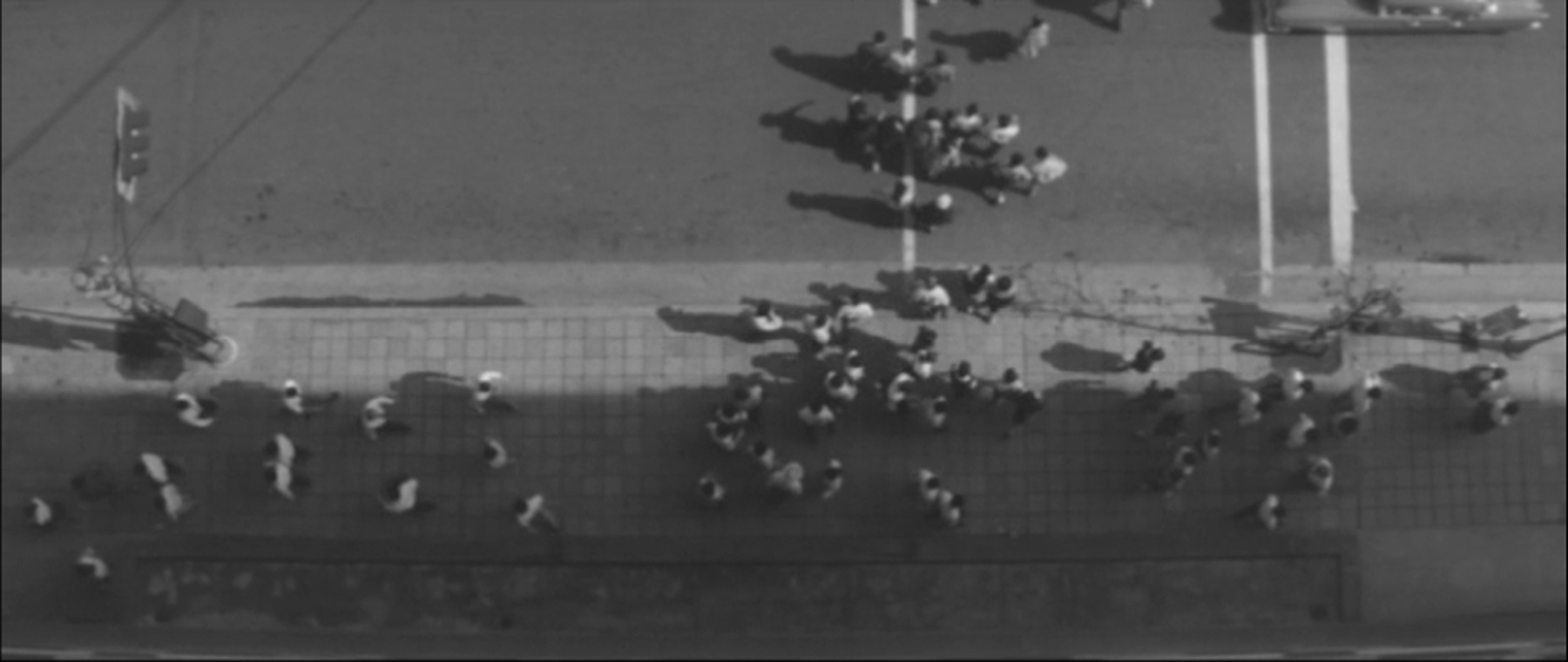In the era of economic boom, roughly from 1950’s to 90’s, being a salary-man (a businessman) in Japan was a ticket to a comfortable life. Not a great, but a decent pay. Nice bonuses twice a year. Unless you are not aiming for the VP’s chair, you don’t have to be seriously competitive, just doing your job is fine. If you are lucky, you may even get promoted. And even if you don’t, there is a pretty fat retirement plan when you survive through roughly 40 years of the service in the same company.
If you don’t screw things up.
And here, ‘screwing things up’ has nothing to do with the actual job itself. It’s more like ‘not being discreet’, or ‘not being smart’.
Ishino (Keiju Kobayashi), a middle-aged, mid-level manager in a mid-size company, is having an affair with Chieko (Chisako Hara), one of his young female staffs. He visits her apartment after hours almost everyday. They have a few drinks, play around and have sex. Then he goes home to his wife and two kids. Ishino and Chieko are being very discreet about their relationship. They never tell, never show any sign of intimacy outside her apartment and never see each other in the eye in the office. But one night, when he was about to leave her in front of her apartment, where he assumed he never meet anyone he knows, Ishino accidentally met his neighbor, Sugiyama. Sugiyama did recognize him, so did Ishino. A day later, Sugiyama was arrested for a murder. A murder he couldn’t have committed, because, at the time of the murder, Sugiyama was walking in the street near the Chieko’s apartment, which is far from the scene of the crime. Ishino is the only witness who could clear Sugiyama of the crime. But making such a testimony would put Ishino in the spot: he has to reveal that he was visiting Chieko’s place. And Ishino thought that revelation would ruin him. Having an affair with a young woman in the office is not a problem, if nobody knows it. But when it becomes a public knowledge, then it is a different matter. That is the rule of the game.
In many of Seicho Matsumoto’s stories, salary-men are often portrayed as timid, yet ego-centric creatures, who, under some circumstances, can be transformed into monsters. Yet, this Ishino is probably the most timid and the most dangerously monstrous of all the Matsumoto’s creations. His moral ineptitude is simply horrifying. He loves no one but himself. Or maybe he doesn’t even love himself; he simply loves the idea of himself. His view of the world is sickeningly narrow, but he doesn’t know it. During the golden age of Japanese cinema in 50’s and 60’s, Keiju Kobayashi was usually typecast as a salary man full of good-natured unassumingness and no ill-will. However, here, he plays the character of Ishino, a typical salary man, as another side of the same coin. The character is molded in the same mold using the same raw material, and it is the same creature. But we are viewing it from the opposite side. Since we know he can be a nice guy, just like hundreds of other salary men Kobayashi played, his performance is all the more convincing and spine-chilling.
In the courtroom, Ishino gives a self-serving lie – which will decisively incriminate his neighbor for a murder he didn’t commit- in the witness stand. During this testimony, we see his eyes – just a couple of black holes open to ever bottomless nothingness. When you stare into the nothingness, nothingness stares you back. And it did. The bottomless nothingness ate Ishino.
I do have an experience of working in a Japanese company, a pretty big, conservative one at that. And I myself was a “salary man”. Not all of us are morally defunct like Ishino, of course. But I did meet some people whose concept of human interaction is utterly incomprehensible. “There are people like that everywhere”, you might say. I know. But the strange thing is, this male-oriented community of supposedly ‘homogeneous’ environment sometimes incubates a bizarre organism. It appears to be a healthy, even good-natured human being, but suddenly you see, in its eyes, a mindless mind with bottomless nothingness.
But I always wonder – what created this monster. Where did he come from? If I am frustrated with Seicho Matsumoto’s novels, and their subsequent film adaptations, it will be precisely this point. It’s not that the story should provide the reason. It feels like they are paper dolls with nothing inside.
[Best_Wordpress_Gallery id=”5″ gal_title=”A Testimony of A Salary Man”]
A Black Picture Book: A Testimony by A Salary Man
黒い画集:あるサラリーマンの証言
Directed by Hiromichi Horikawa
Written by Shinobu Hashimoto, Based on a novel by Seicho Matsumoto
Produced by Reiji Miwa,
Cinematography by Asakazu Nakai
Starring Keiju Kobayashi, Chieko Nakakita, Chisako Hara
Toho
1960
Copyrighted materials, if any, on this web page are included as “fair use”. These are used for the purpose of research, review or critical analysis, and will be removed at the request of copyright owner(s).

